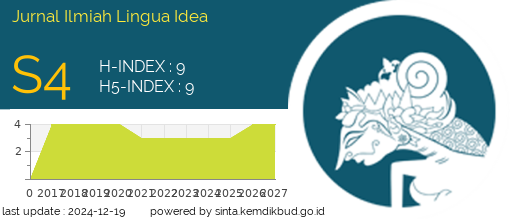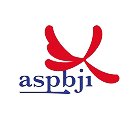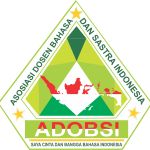Developing Metacognitive Model on In-Service Teacher’s Academic Writing Through Virtual Flipped Classroom
Abstract
The current study has two objectives. The first is to describe the process of developing a metacognitive model on in-service teachers’ academic writing through virtual flipped classrooms and then secondly, to investigate the teachers’ research writing interests using a metacognitive model on in-service teachers’ academic writing through virtual flipped classrooms. This research was conducted in the Demak regency. The researchers also used the Research and Development method. Validation results exemplify that the application of a metacognitive model to academic writing in the in-service teachers through virtual flipped classroom specifically used appropriate teaching materials to be used in classroom teaching, the attention is given to the outcomes of the validation, such as; the concept of conformance indicators, material performance indicators, demonstration indicators, and capability indicators. This proves that the metacognitive model on in-service teachers’ academic writing through virtual flipped classroom applications runs smoothly and according to what is expected. In addition, it has positive interests from the teachers which could give good impact in their writing research article.
References
Basal, Ahmet. (2015). The implementation of a flipped classroom in foreign language teaching. Turkish Online Journal of Distance EducationTOJDE October ISSN 1302- 6488 Volume: 16 Number: 4 Article 3.
Bergmann, J., & Sams, A. (2012). Flip your classroom: Reach every student in every class every day. Eugene, OR: ISTE.
Brent. J, Graham. (2013). Student perceptions of the flipped classroom. Columbia: The University of British Columbia.
Collado-Valero, J., Rodríguez-Infante, G., Romero-González, M., Gamboa-Ternero, S., Navarro-Soria, I., & Lavigne-
Cerván, R. (2021). Flipped Classroom: Active Methodology for Sustainable Learning in Higher Education during Social Distancing Due to COVID-19. Sustainability, 13(10), 5336. MDPI AG. Retrieved from http://dx.doi.org/10.3390/su13105336.
Gredler, M. E. (2011). Learning and instruction: Teori dan aplikasi (edisi keenam). Jakarta: Kencana Prenada Media Group.
Hacker, D. J., Keener, M. C., & Kircher J. C. (2009). Writing is applied metacognition. In D. J. Hacker, J. Dunlosky, A. C. Graesser (Eds.), Handbook of metacognition in education (pp. 154–172). New York, NY: Routledge. doi:10.4324/9780203876428.ch9.
Ismail, S. S.; Abdulla, S. A. Virtual flipped classroom: New teaching model to grant the learners knowledge and motivation. "JOTSE: Journal of Technology and Science Education", Març 2019, vol. 9, núm. 2, p. 168-183. DOI: 10.3926/jotse.478.
Istianingrum, A., & Karnawati, R. (2020). Efektivitas Virtual Classroom dan Flip the Teacher dalam Flipped Classroom pada Chuukyuu Bunpou. Journal of Japanese Language Education and Linguistics, 4(2), 115-131. doi:https://doi.org/10.18196/jjlel.4238.
Mariyana, R. (2020). Pengembangan Desain Model Pembelajaran Virtual Flipped Classroom. Jurnal Pembelajaran Inovatif, 3(2), 150 - 156. https://doi.org/10.21009/JPI.032.10.
Rachmat, M., Muliastuti, L., & Emzir, E. (2020). The Implementation of Flipped Classroom Learning Model in Teaching Paragraph Writing. Loquen: English Studies Journal, 13(2), 103-115. doi:10.32678/loquen.v13i2.3573s.
Sugiyono. (2010). Metode penelitian pendidikan pendekatan kuantitatif, kualitatif, dan R & D. Bandung : Alfabeta.
Veenman, Marcel V. J., Van Hout-Wolters, Bernadette H. A. M. dan Afflerbach, Peter. (2006). Metacognition and Learning: Conceptual and Methodological Considerations. Metacognition Learning, 1: 3–14. DOI 10.1007/s11409-006-6893-0.
Vliet, E. A. V., Winnips, J.C. and Brouwer, N. (2015). Flipped-class pedagogy enhances student metacognition and collaborative-learning strategies in higher education but the effect does not persist. CBE Life Sciences Education, 4(3): ar26. DOI: 10.1187/cbe.14-09-0141.
Authors who publish with Jurnal Ilmiah Lingua Idea agree to the following terms:
- Authors retain copyright and grant the journal right of first publication with the work simultaneously licensed under a Creative Commons Attribution License (CC BY-SA 4.0) that allows others to share the work with an acknowledgment of the work's authorship and initial publication in this journal.
- Authors are able to enter into separate, additional contractual arrangements for the non-exclusive distribution of the journal's published version of the work (e.g., post it to an institutional repository or publish it in a book), with an acknowledgment of its initial publication in this journal.
- Authors are permitted and encouraged to post their work online (e.g., in institutional repositories or on their website) prior to and during the submission process, as it can lead to productive exchanges, as well as earlier and greater citation of published work.





















.png)




_.png)


